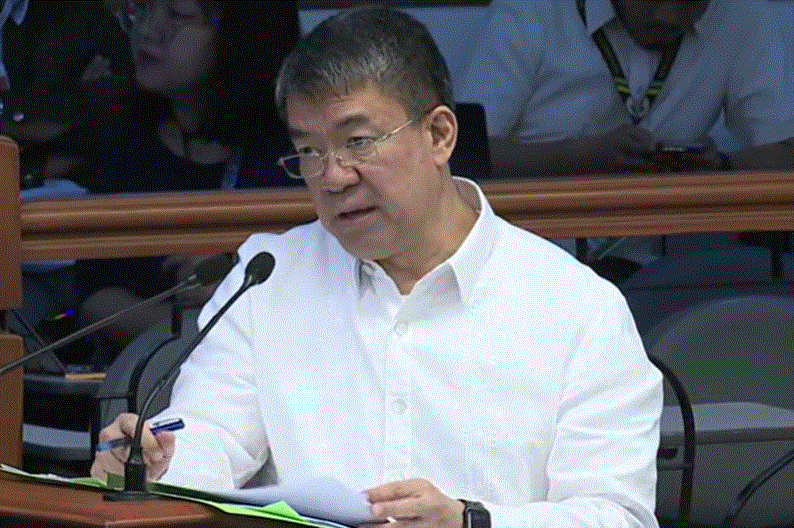Koko to DSWD: Why social aid AKAP 'off limits' to senators?

Senate Minority Leader Aquilino "Koko" Pimentel III on Monday asked the Department of Social Welfare and Development (DSWD) why the social assistance program Ayuda sa Kapos ang Kita Program or AKAP seemed to be "off limits" to senators.
At the Senate finance subcommittee's hearing on DSWD and its attached agencies' proposed P229.8 billion budget for 2025, Pimentel compared the senators' participation in the distribution of AKAP and the Assistance to Individuals in Crisis Situation (AICS).
"As senators, we are informed of AICS. Sometimes, we can visit the AICS distribution. Nakikita namin with our own eyes maganda nga. Actually, ako'y nakapagsalita na sa isang AICS distribution...How come AKAP seems to be invisible to us? We have not been invited to any AKAP. If it's like AICS, it must be also like a distribution, how come it is invisible to senators, unlike AICS which is visible to senators?" Pimentel asked.
"As far as senators are concerned it's like a secret, invisible, off-limits program. Bakit? Di ko maintindihan," he went on.
Pimentel also raised that the line item budget for AKAP under then 2024 General Appropriations Bill (GAB) was not deliberated during the Senate plenary deliberations on the budget measure.
Senator Imee Marcos, chairperson of the subcommittee, said the senators "were never made aware of this program and it was never requested in the first place by the DSWD."
"In the NEP (National Expenditure Program for) 2024, there is no AKAP...is that correct?" Marcos said, referring to NEP, the budget bill as proposed by the Executive Department.
DSWD Secretary Rex Gatchalian admitted that they did not ask the Development Budget Coordination Committee for the funding of AKAP under the 2024 and 2025 budget bills.
For 2025, Gatchalian said the DSWD only asked to "augment" the funding for AICS.
In line with this, Pimentel then questioned the purpose of AKAP. At the early part of the hearing, Gatchalian told the senators that the DSWD "has been verbalizing its desire for a near-poor program" which would help Filipinos whose income could hardly cover their necessities, especially in times when inflation is high.
But Pimentel pointed out that inflation affects both the poor and non-poor. Hence, there is no need for another program similar to AICS.
"Kaya ngayon lang natin to nasasabi kasi never dumaan sa plenary. Hindi naman ito natanong ano bang programa ito. How come biglang near-poor ang phrase na natin and we link it to inflation as if the poor are insulated from inflation. It's the same thing kaya nga tama siguro kung if you can afford this amount, why not put it in AICS?" Pimentel said.
"Masyado niyo pinapahirap buhay niyo. Tapos kailangan niyo pa siya i-distinguish from the poor as being near poor. Only the near poor is qualified under AKAP. Let's simplify it na lang kasi tingnan mo, naging obscure program tuloy," he added.
For Pimentel, AKAP is an "unnecessary complication" that is reflected in the program's obligation rate of 21.18 percent.
"How come there's a surprise program for us arising out of the bicam na hindi nadi-discuss sa plenary? I-reject niyo na lang, sabihin niyo, 'Legislators, your wisdom is better expressed by putting it in a regular program like AICS where the parameters are very clear,'" the minority leader said.
In response, Gatchalian said they will defer to the lawmakers' decision on their budget proposal.
The P26.7 billion budget for AKAP was first questioned by the senators when the Senate investigated the alleged payoffs related to charter change efforts through people's initiative.
According to former Senator Sonny Angara, ex-chairman of the Senate finance committee, the House of Representatives initiated the inclusion of the AKAP in the unprogrammed funds under the 2024 budget, and he was informed of this during the Bicameral Conference Committee deliberations.
In December last year, Speaker Martin Romualdez said the 2024 budget has earmarked P26.7 billion for the expansion of government subsidies to near-poor households under AKAP, which intends to cover 12 million households.
House leaders issued the statement after Pimentel questioned the P450 billion in unprogrammed funds that were introduced during the bicameral conference committee for the then-2024 budget bill. —LDF, GMA Integrated News




